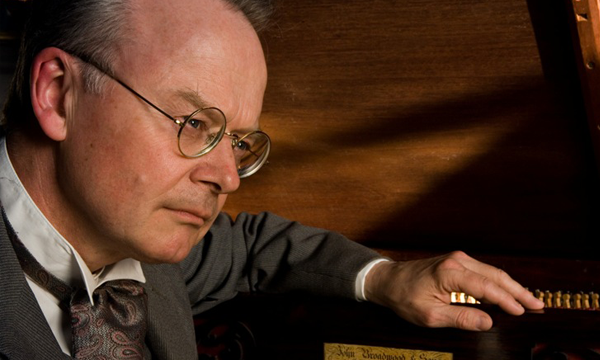David Owen Norris
David Owen Norris, the first recipient of the Gilmore Artist Award, has played concertos throughout North America and Australia, along with several appearances in the BBC Proms. A television program entirely devoted to his work on the Elgar Piano Concerto, ending with a spectacular performance of the complete work, has been shown frequently. Concerto recordings include his own composition, Piano Concerto in C, with the BBC Concert Orchestra, as well as works by Lambert, Phillips, Horowitz, and Arnell. Worldwide solo engagements have particularly featured the music of Brahms, Schubert, Poulenc, Bax, and Elgar. He has recorded all of Elgar’s piano music, including his own reconstruction of the magnificent Concert Allegro of 1904, his own transcriptions of the Pomp and Circumstances marches, and Karl-Elert’s transcriptions of the First Symphony and the Symphonic Study: Falstaff.
Mr. Norris enjoys performing on early pianos. His discovery that the world’s first piano concertos were written around 1770 in London for the tiny square piano led to a complete reconsideration of that instrument, which led to a successful recording and concerto tours of Britain, Europe, and the US.
His other early piano recordings include Schubert’s Winterreise with David Wilson-Johnson; Schubert’s first song-cycle, the Kosegarten liederspiel of 1815, of which he gave the modern premiere in 1997; Entertaining Miss Austen, a comprehensive selection from Jane Austen’s own music collection; the audio-guide to the Cobbe Collection, playing pianos formerly belonging to JC Bach, JB Cramer, Thalberg and Bizet; and, on Elgar’s piano, a double disc of songs and piano pieces, including the first conception of what eventually became the Cello Concerto.
2017 saw the start of the Jupiter Project, comprising concerts, workshops, CD recordings and video relating to the remarkable body of mid-nineteenth-century chamber music arrangements of Mozart piano concertos, symphonies, and overtures.
Mr. Norris has been a familiar face on music television since 1990, when he presented The Real Thing?: Questions of Authenticity on BBC2, described by the Daily Telegraph as “the most probing and literate programme on music seen for a long while.” Additional programs have included Chord of the Week on BBC2 and Perfect Pianists, which he presented from Chopin’s Pleyel piano, on BBC4. His popular Radio 4 Playlist series is often repeated, and on Radio 3 his contributions to Building a Library are keenly relished. He has a long history with Radio 3, which discovered him as a young artist: in his first few years as a solo performer he made over two hundred broadcasts. For several years in the 1990s he had his own weekly show, The Works, and in the middle years of that decade he presented In Tune.
David Owen Norris’ rise as a composer is more recent. Audiences have been discovering his music through a series of major works including the oratorio Prayerbook, the Piano Concerto in C (both recorded commercially) and the Symphony. Smaller works include Think only this and Tomorrow nor Yesterday (two separate song cycles); STERNE, was THE MAN (a cantata); and Die! Sober Flirter (a radio opera commissioned by the BBC). He wrote two large-scale works in 2015: Turning Points, a celebration of democracy supported financially by the Agincourt 600 Committee and Henge Music, a multi-media piece for organ and saxophone quartet with film and poetry. The latter, supported by Arts Council England, will soon be available on a CD.
Mr. Norris is Professor of Musical Performance at the University of Southampton and Visiting Professor at the Royal College of Music and at the Royal Northern College of Music. He became a Fellow of the Royal College of Organists (by examination) at the age of 19. He was elected one of the three hundred Fellows of the Royal Academy of Music at the age of 29 and was recently elected a Fellow of the Society of Antiquaries of London. He is an Honorary Fellow of Keble College, Oxford.
His unusually varied career has also seen him as a répétiteur at the Royal Opera House, a harpist at the Royal Shakespeare Company, Artistic Director of the Petworth Festival (UK) and the Cardiff International Festival (Wales), Gresham Professor of Music, and Chairman of the Steans Institute for Singers at the Ravinia Festival in Chicago. He also wrote a book and provided analysis to accompany Beethoven 9, an app that explores Beethoven’s instantly recognizable work, which won the iTunes Best Music App Award in April 2014.

